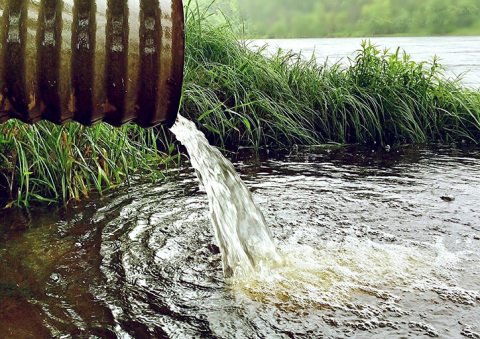Dr Andrew Singer is leading CEH's research into antimicrobial resistance in the environment. Antimicrobials represent a small fraction of the chemicals that are continuously released into the environment from sewage works. However, their direct, negative impact on microorganisms (in the environment) provides a new motivation for examining the hazards within our waste stream, and its potential for effects on the environment and human health. Here he provides a perspective, first shared in the ENDS Report, which explains why change is needed in how we handle our wastewater.

Rivers have been and remain civilisation’s wastewater treatment system. Even a superficial understanding of the anthropogenic inputs to our rivers would be sufficient to conclude that our waterways have changed chemically and biologically. Despite the importance of our rivers for the provision of drinking water, habitat, irrigation, transportation and recreation, most of the public are unlikely to think about them until a raw-sewage spill kills fish in a local river or they hear about a celebrity like David Walliams getting 'Thames Tummy' after swimming in the river Thames.
These rare, fleeting events could be the only time when members of the public wonder about river water quality.
"Rivers have been and remain civilisation’s wastewater treatment system."
Large metropolitan sewage works would have several thousand different chemicals dissolved in their influent. Many of these chemicals pass through the sewage works into the river without even the most diligent scientist noticing. A very small number of these chemicals have been shown to be hugely impactful on freshwater systems, such as phosphate, ammonia and metals. However, much less understood is the impact of organic pollutants.
Of the thousands of chemicals in wastewater, upwards of 5,000 can be pharmaceuticals, with a small, but important, subset of these being antibiotics. The release of these chemicals into our wastewater from clinical and over-the-counter use has allowed many rivers to attain concentrations sufficient to select for antibiotic resistance. Similarly, antivirals used during an influenza pandemic were recorded in many rivers at concentrations sufficient to select for antiviral resistance.
Global crisis
Growing resistance to antimicrobials (all drugs that inhibit or kill pathogens, including antibacterials, antifungals and antivirals) is now a global crisis. The continued release of sewage effluent into our environment would only serve to hasten the spread of antimicrobial resistance and 'nurture' the conditions for the evolution of novel antimicrobial resistance and further infectious-disease treatment failure.
"The continued release of sewage effluent into our environment would only serve to hasten the spread of antimicrobial resistance and 'nurture' the conditions for the evolution of novel antimicrobial resistance and further infectious-disease treatment failure."
Pharmaceuticals are not even the most abundant of organic chemicals in wastewater – this title is shared by chemicals in the category of detergents, shampoo, surfactants, biocides and 'lifestyle chemicals' such as caffeine, artificial sweeteners and nicotine. Societal addictions such as illicit drugs can also be recovered from every litre of metropolitan wastewater effluent. In fact, there are so many illicit drugs in the wastewater, that the Drinking Water Inspectorate highlighted it as a health risk for drinking water abstracted from sewage-impacted rivers.
The feminisation of fish from steroid estrogens in sewage effluent catalysed discussions in Europe on upgrading sewage treatment works. Such an investment was estimated to require more than €30bn in England and Wales alone. The investment made in cleaning our wastewater could, however, be further leveraged by additional processing into potable water, thereby recouping much of the cost. There are numerous gains beyond cost and environmental health to be had by closing the water cycle loop. Such an investment future-proofs society from all chemicals in our waste stream, as they would all bypass the environment.
"There are numerous gains beyond cost and environmental health to be had by closing the water cycle loop."
Treating our wastewater to drinking water standards will:
- fuel the 'green chemistry' movement to replace persistent chemicals with biodegradable alternatives;
- encourage sustainability by moving towards the use of products that can be recycled;
- nurture the development of systems to recover value from waste;
- encourage source reduction.
Societal conversion to the proposed 'closed loop' for our water provision and treatment will take time. However, the aspiration should remain true: the practice of using our rivers for wastewater treatment must come to an end. It is time for a step change in how we value water. Given the immediate pressures of containing antimicrobial resistance within a world of increased water stress, it is probably more of a matter of 'when' this step change happens, not 'if'.
